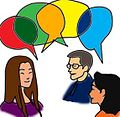Development Cooperation Handbook/Issues/Sharing knowledge and resources

Issue 10
Sharing knowledge and resources
![]() ⇒ Episode 7 - MDG 7: Ensure environmental sustainability
⇒ Episode 7 - MDG 7: Ensure environmental sustainability
In other sections of this handbook
![]() Article on Wikipedia ⇒ Knowledge management
⇒ Knowledge
⇒ Knowledge community
⇒ Knowledge ecosystem
Article on Wikipedia ⇒ Knowledge management
⇒ Knowledge
⇒ Knowledge community
⇒ Knowledge ecosystem
Prolegomena
[edit | edit source]Cooperation actions are valued as much as they "produce results", i.e. achieve the expected objectives of improving the development opportunities of the target populations. And this is generally measured in improved food security, sanitation, improved health services, improved political representation of marginalized communities, etc.
What often goes underestimated is the learning that cooperation projects produce. And without an adequate system of collection and sharing of such learning, this asset may not be available to those who need it most, i.e. the local communities who are supposed to continue and expand with local resources the activities started with external support.
This project has made knowledge collection and sharing its central objective. And in order to serve well the our purpose we have asked the development stakeholders to tell us what what kind of knowledge that is most required by those who work to remove poverty. We also wanted to understand what are the challenges in collecting and organized learning from projects and what is the communication style that facilitates intercultural understanding.
We have learned that in spite of the fact that development actors have fully recognized that knowledge constitutes an essential resource for development, knowledge sharing constitutes a major challenge because many organizations consider their specialized know-how as a strategic asset and want to maintain their competitive advantage on others that compete in fund raising.
Testimonials
[edit | edit source]
We asked different stakeholders to share with us their experiences of knowledge management and how we can contribute in filling the knowledge gap among development cooperation actors. We also want to compare the aptitudes of the peoples of different nations in assuming responsibility for global development and inter-cultural dialogue.
Below are the answers we collected. The work is in progress and you are welcomed to contribute.
Click on the name of the contributor to go to the page with the full interview.
Dialogo tra Silvia Costa e Francesco Brancatella
[edit | edit source]


Catherine Ray - Spokesperson for EuropeAid
[edit | edit source]
How to inform the EU citizens
of the development work
done with their money.
We have to distinguish between embodied and disembodied knowledge.
C.B. Rao UN Officer
[edit | edit source]There is a moral duty
Education is a fundamental right and that is very important. If you say that social cohesion is a resource to go up the economic ladder in the sense that it has to be available for all and it everyone should have the possibility to have it. Even though we have a number of problems in Europe, even though we have a number of disparities in our society; social cohesion has been for many years in the heart of the architecture of the European Union. Social inclusion and social coherence has been in the heart of Europe and European policies.
We are directly putting money in the big envelope of the government. But this is not limited in just signing a cheque to the government. We are a very important party in a number of discussion of the steering committee which is in charged of the implementation of the program. But we are also helping in designing and monitoring the program. Through our presence we can influence, but this does not mean imposing a model but offering our experience, proposing technical assistance, showcasing are lesson learned and also bad experiences from where they can learn and be a source of inspiration.





____________
Back to the ⇒Table of Content
